
Reimagining Publishing, An Author Centric Approach
Updated 12 November 2025
A Publishing House Built for Authors, by an Author.
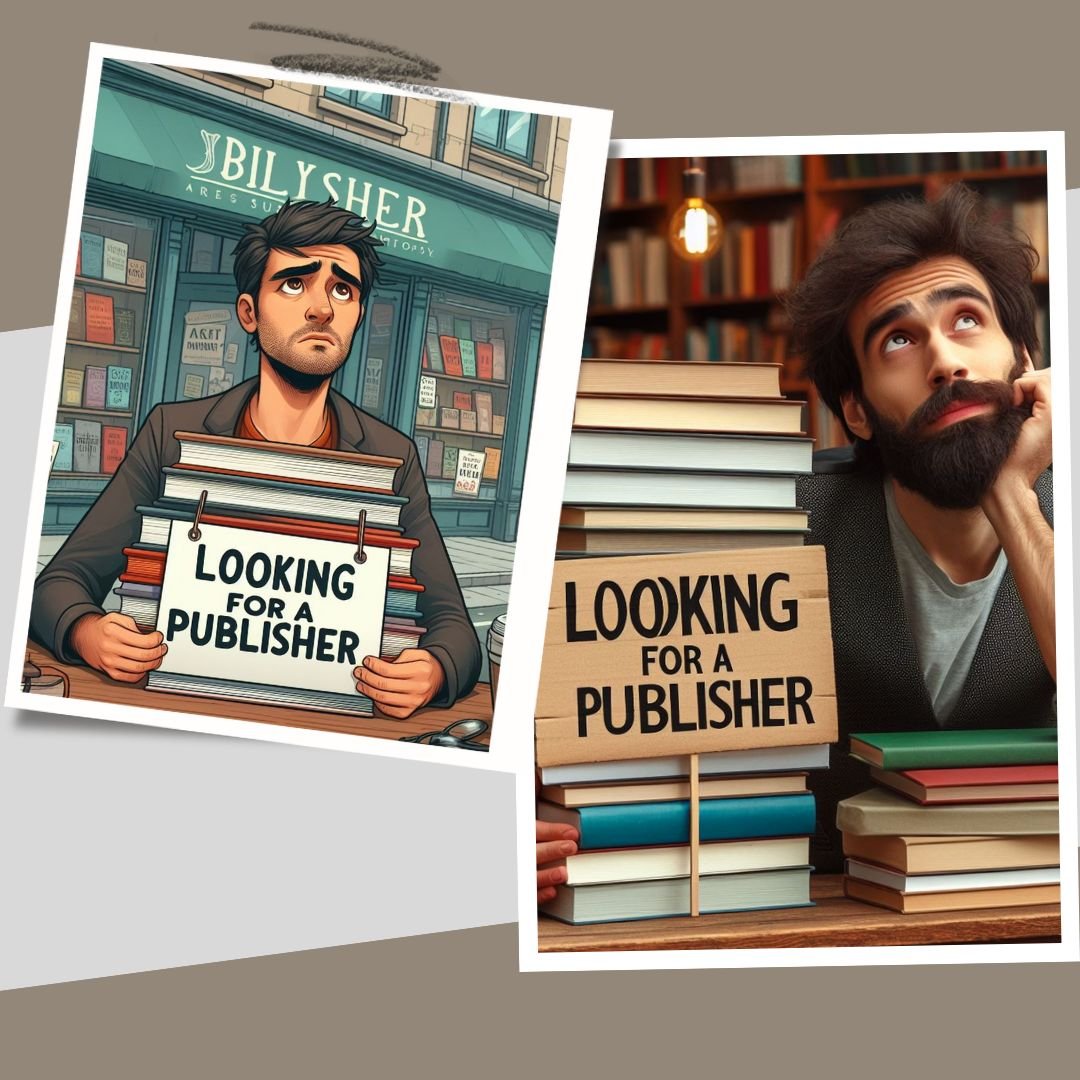 My search was an eye-opener for me. First, I discovered how hard it is to get a publisher unless you are already reasonably successful. But the real shock was reviewing what they offered, and that forced me to define in my mind what I wanted a publisher to be.
My search was an eye-opener for me. First, I discovered how hard it is to get a publisher unless you are already reasonably successful. But the real shock was reviewing what they offered, and that forced me to define in my mind what I wanted a publisher to be.
Once I knew what I was looking for but couldn’t find one that met my benchmarks, I ultimately became one.
Building the Publishing House Authors Deserve — Not the One They’re Stuck With
I think you will see why Divya Publishing House is very different from most publishers. We offer a credible alternative to self-publishing or the traditional route.
In this article, I’m going to focus on one aspect of our unique approach to co-publishing. It is what we call “the author-centric” approach, which is the heart and soul of our philosophy and our reason for existence.
Of course, my goal is to encourage you to choose the Divya Co-Publishing model when you publish your next book—or your first. I wouldn’t be here if we hadn’t developed a comprehensive, verifiable approach to publishing that I believe will help you be more successful. You can easily check the research that supports everything you read here and throughout this website. I will often supply links so you can review the research yourself, and I will update articles when time permits, to include the latest research and a review of our progress.
How the Idea for an Author-Centric Approach to Publishing Was Born
Most importantly, I think it is time someone built a publishing company for writers—one that puts the writer’s needs at the core of the business.
“I thought authors were important because they write the books.
That was my first mistake”.
I first realized that I loved to write in high school. Later, as a consultant, I wrote research-driven reports and white papers that were peppered with interesting insights. This approach influenced my training programs, and I enjoyed my work and the recognition.
When COVID-19 struck and we all went into lockdown, I used the unexpected spare time to follow another passion I’d deferred because of work pressure: I decided to write some books
When I opened my “Book Ideas” folder, it had 28 non-fiction outlines and, to my surprise, 56 outlines for novels, and some of them had multiple plots or a raft of alternative directions the book could take.
In fact, over the past 20 years, every time I had an idea for a plot, I wrote it out. You could say my hobby was creating detailed plots, not writing books. 😊
I could see I had enough material to become a full-time writer, and I must admit, the idea of writing an award-winning book or becoming a New York Times bestseller excited me.
But by the time the initial excitement was a distant memory after ten months of hard work writing my first novel, reality hit me. My consulting business was picking up, my staff were returning to work, and I had no idea how much I would earn as a writer compared to consulting. So, I did the consultant thing: I researched it.
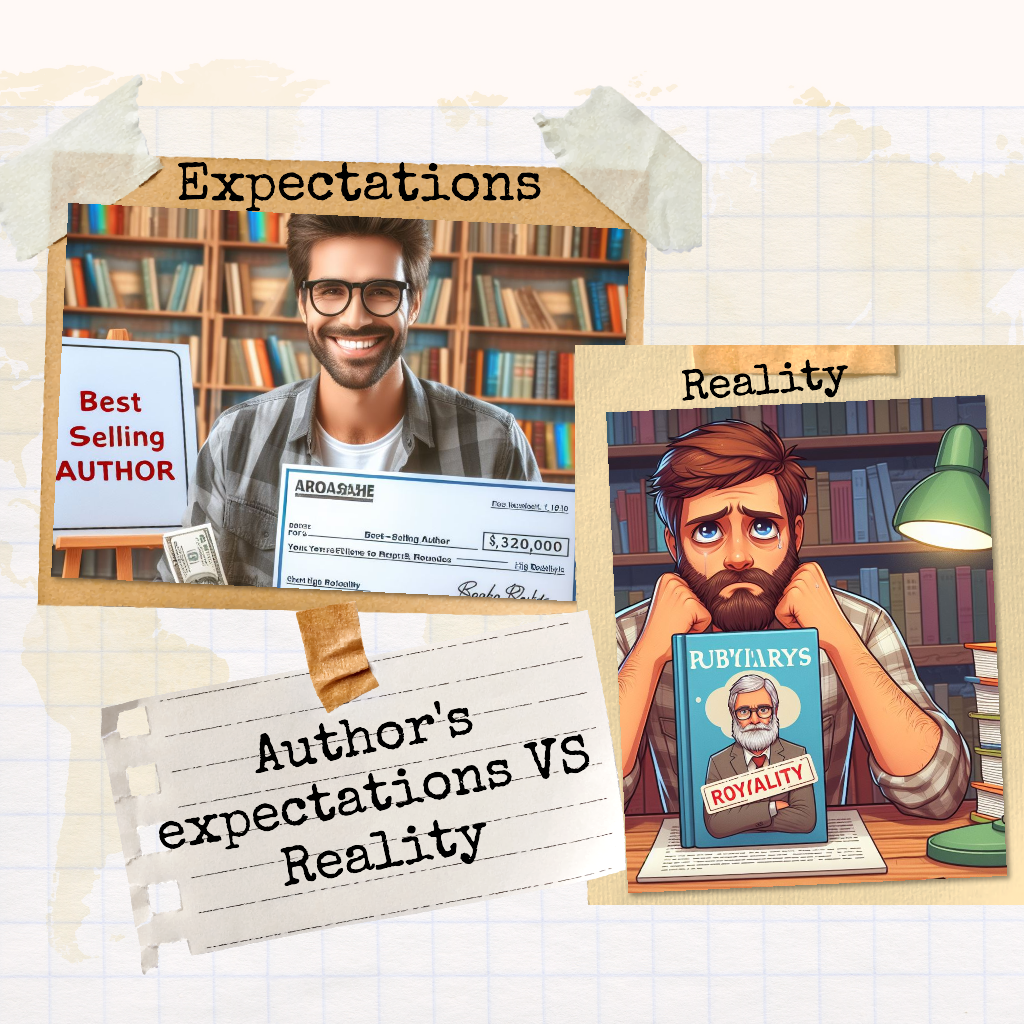 At first, I didn’t believe what my research uncovered. I spoke to many authors in writer’s forums, including several who train authors to be better writers. Most said they don’t make a living wage from books alone; they rely on a full-time job, or they have a side hustle—either a second (and sometimes a third) part-time job, or they do PR, copywriting, ghost writing, edit other people’s books, coaching or anything that pays the bills.
At first, I didn’t believe what my research uncovered. I spoke to many authors in writer’s forums, including several who train authors to be better writers. Most said they don’t make a living wage from books alone; they rely on a full-time job, or they have a side hustle—either a second (and sometimes a third) part-time job, or they do PR, copywriting, ghost writing, edit other people’s books, coaching or anything that pays the bills.
Initially, I wondered why, but when you do the math, it’s obvious. Authors often earn single-digit or low double-digit royalties (a commission on book sales) and they depend on the publisher to market their book(s).
Why Most Publishers Fail Authors — and What We’re Doing About It
Unfortunately, publishers know a book generates initial sales from in-store promotions and reviews in the first three months. If it does well, they may promote it. For new or unknown authors, extra promotion usually hinges on early momentum. Established authors get pre-launch and sustained promotion if sales continue.
However, publishers expect their authors to market their own work. In our article “The Publishing Industry is Booming While Authors Are Going Broke” I cite one example of a well-known successful author who is successful because of her own marketing efforts. Here is an excerpt:
“ …if JK Rowling had not gone out and marketed her book herself, by doing her own PR, arranging interviews on radio shows etc., she may not be the successful author we know today. But she obviously could do that. Not everybody can or does. Many authors are too busy working two or three jobs to survive and writing their next book to do a good job of marketing as well.”
After roughly three months, bookshops often return unsold books to the publisher to make room for new titles. The cycle favors constant new releases and short shelf lives for titles without immediate momentum.
What Happens After Bookstores Remove Books?
After bookstores return unsold books to the publisher, future sales are mainly online, driven by the author’s social media activity, their website, email marketing, online bookstores like Amazon, and niche outlets. However, these sales rarely motivate the publisher to spend money promoting the book, though they still take a percentage.
Thus, the job of marketing falls to the author, who rarely has the time or expertise to do it well. Some train themselves and maintain a regular flow of sales, but many struggle.
How to Earn $100,000 a Year as an Author
It is possible to make $100,000 a year, or more, as an author, so let’s have a look at how?
The sales of one book are usually not enough to earn a decent living. Authors need multiple titles for aggregate sales to add up to a decent income. In 2023, research showed that authors who consistently earned $100,000+ in 2023 typically had catalogs of between 30–33 published titles.
Survey Conducted 2023
Monthly Income and the Number of Books Published
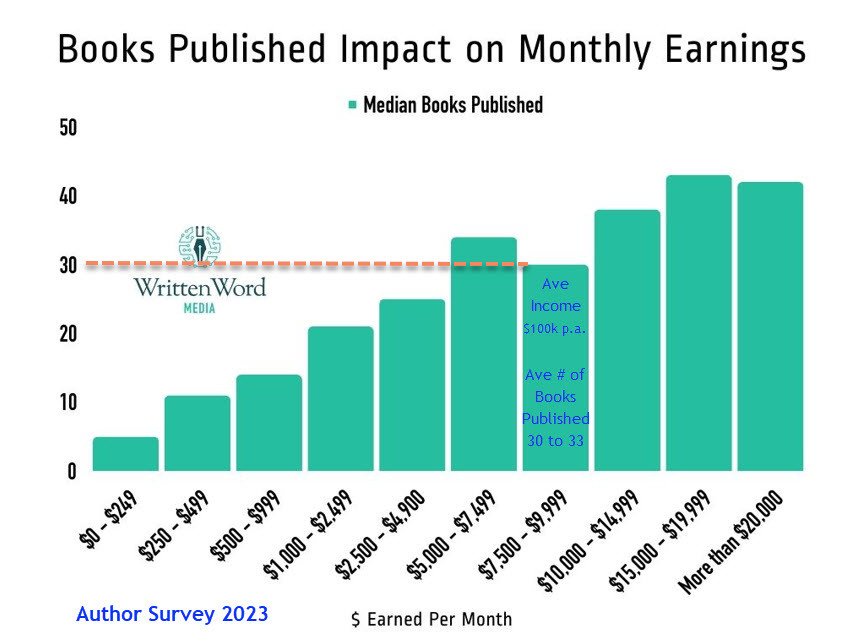
Link to survey: https://www.writtenwordmedia.com/survey-results-the-state-of-indie-authorship/
Survey Conducted 2024
However, when they conducted the same survey in 2024, this was the result:
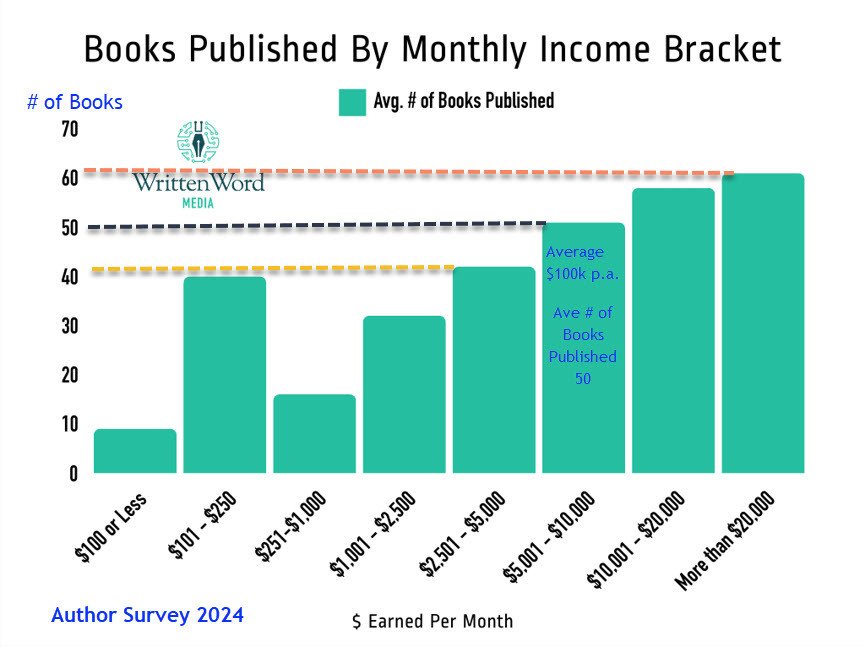
Link to survey: https://www.writtenwordmedia.com/2024-indie-author-survey-results-insights-into-self-publishing-for-authors/
By December 2024, authors typically needed catalogs of between 40 and 60 published titles to achieve this goal.
How to Earn More, Publish Smarter, and Stay True to Your Vision
At Divya Publishing House, we help authors reach comparable income with fewer books by expanding each manuscript into multiple revenue streams—for example, developing a course from the book, a companion journal or workbook, a concise cheat sheet, and even a coloring book when appropriate. One book becomes a suite of related products that compound sales and visibility.
Unfortunately, most writers find it very hard to write that many books and do all the marketing—plus hold down a second job that pays the bills.
The Day I Realized Publishing Was Broken — and Decided to Fix It
And that is why authors need a partner, currently called a publisher. My epiphany was the realization that we need to redefine what we mean by “publisher”, because the role should include a lot more than printing and distributing books for sale.
At Divya Publishing, we define that partner as an author-centric publisher—one who puts the author’s holistic needs at the core of the business, which covers a lot more than just publishing and distributing a book.
The Divya author-centric co-publishing model surrounds the author with every support system they require from discussing the initial idea, giving advice, editing, formatting, publishing, business consulting, and promotion in all the forms deemed necessary for the long-term success of the book and the author. These support systems include, but are not limited to:
- Creating social media accounts
- Assisting with social posting
- Creating a website and/or blog
- Assisting with website and blog content
- Building a mailing list
- Running email marketing campaigns
- Creating and managing ads
- Producing videos, both short TikTok reels and longer videos
- Creating derivative products as additional revenue streams (e.g., courses, journals, workbooks, cheat sheets, and—in suitable cases—coloring books)
- Creating Audio books
- And more, tailored to each author’s goals
At Divya Publishing House, we practice author-centric co-publishing, which means we take a long-term view. We will advise, train, direct, work with, work for, initiate actions, and implement agreed strategies in the service of our authors’ long-term success. We view the three-month launch period as the beginning of a book’s life, not the end.
Why We Created a Publishing House That Puts Authors First
Because every author is unique, we make it easy for authors to tailor our co-publishing support services to suit their needs. This means we can take on tasks that slow authors down, like marketing, while leaving them free to do the tasks they enjoy, such as writing. For example, consistent surveys show authors dislike marketing but spend almost a Week a Month doing it.
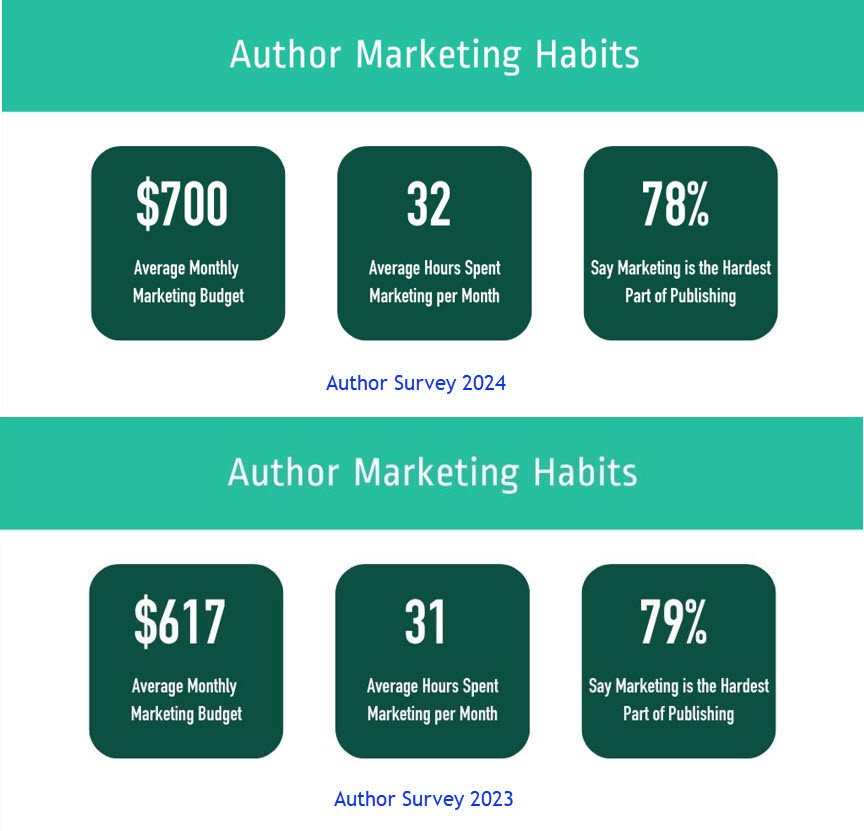
Co-publishing helps authors write more books or courses and ultimately earn a good living as a writer because they do the things they are good at and delegate the rest to Divya Publishing.
A Publishing System Built for Authors, by an Author, to Deliver the Best Result
A unique feature of our co-publishing model is that every book project we agree to publish will get an advance, and that advance is used to pay for or subsidize the services the author requires us to provide, such as editing, formatting the book or marketing. For example, here are the results from the survey of authors in 2024 regarding how much they pay for editing:
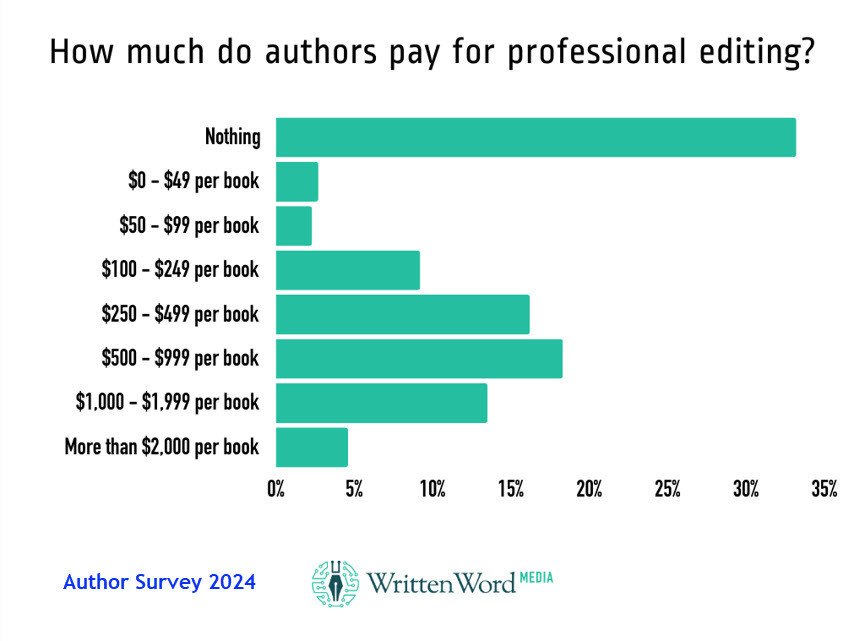
However, at Divya Publishing House, our authors benefit first from the cost savings achieved by centralizing all the services they need under one roof. Second, we realized the most effective way to use the book’s advance, so all authors benefit from it, is to use it to generate a higher income faster than traditional publishing usually does.
We achieve this result by enabling the author to choose which services they want to delegate to us, such as editing, marketing, social media management, etc. which already have a discounted fee for our authors and then use the advance to subsidize those fees even further.
The benefit of using the advance to pay for services is that the important tasks get done rather than waiting for the author to get time to do them or paying higher fees to expensive freelancers to do them, and that helps the book get published faster.
However, Divya adds more advantages to the partnership because our professional skills and innovative marketing strategies help the work sell better, for longer, thus increasing the author’s annual income.
We believe this innovation in how book advances are paid is “The Publishing Revolution Writers Have Been Waiting For! If you don’t know how traditional publishers pay advances (which are just loans authors must repay before earning future royalties) and how useless they are for most authors, please read this article, How Much Do Authors Earn in Royalties per Book?
Ready to put an author-centric team behind your work?
Founder & CEO Divya Publishing House
For More Information see Author Bio





